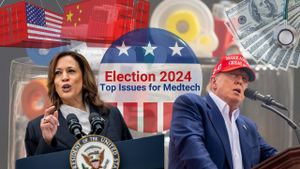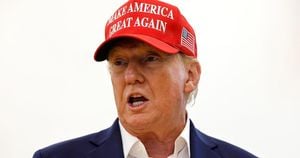Under the glaring spotlight of the upcoming election, tensions run high as political figures clash and voter sentiments shift. Last week, Liz Cheney, the former Wyoming congresswoman and outspoken critic of Donald Trump, ignited conversations around women’s influence on the electoral process, challenging Trump's rhetoric as she claimed, “Women will save us from Trump in this election.” Her candid assertion has echoed across various platforms, rallying support from female voters disillusioned by the former president's actions and statements.
Cheney, who has become one of the most prominent adversaries of Trump within the Republican Party since the January 6 insurrection, vented her frustrations on The View, drawing attention to how Trump and his allies have disregarded women's autonomy, particularly referencing incidents where they expressed disdain for women’s voting decisions. “Every time you see people like Charlie Kirk or Donald Trump acting horrified at the idea of women making their own decisions about how to vote, it’s really important to reach back and confront the misogyny inherent in all of this,” she said. This rhetoric isn’t merely heartbreaking; it aims to resonate with undecided and right-leaning women, striving to shift the political narrative.
Continued engagement from community leaders and influential figures like Cheney appears to be galvanizing women voters against Trump, especially after some intensely charged comments he made. During his recent appearance at Tucker Carlson's Live Tour, Trump, 78, directly targeted Cheney, branding her as a “radical war hawk” and insinuated violence against her. “Let’s see how she feels about it...when the guns are trained on her face,” he quipped. This kind of rhetoric couldn't sit well with voters, particularly those concerned about the rising tide of violence associated with political discourse.
The political climate, especially leading up to Election Day, highlights the stark contrasts between the candidates. After Trump’s comments, Cheney vehemently opposed his threats, likening them to tactics used by dictators to instill fear. “This is how dictators destroy free nations. They threaten those who speak against them with death,” she voiced on social media, framing Trump as unfit for leadership.
Vice President Kamala Harris echoed Cheney’s sentiments, asserting Trump’s increasing violent discourse disqualifies him from being president. “Anyone who wants to be president of the United States who uses violent rhetoric is clearly disqualified,” she affirmed, emphasizing the urgency for voters to assess whom they deem fit to lead the nation. This prompted conversations among voters, particularly women, about the kind of political climate they desire moving forward.
The backdrop against which Cheney and Harris make their statements is significant. Across the nation, particularly in battleground states, early polls suggest female voters are increasingly driven by issues surrounding women's rights, personal safety, and the impacts of political violence. Female voter turnout is expected to play a pivotal role, as both candidates campaign tirelessly to resonate with women who feel threatened by the current political rhetoric. For Harris, gaining votes from right-leaning women who may traditionally lean toward the Republican Party seems increasingly possible, especially as Trump's comments spur reactions from progressive women and moderates alike.
Meanwhile, as we look at Lancaster County, Pennsylvania—a key area for both parties—demographics show increasing numbers of women stepping up to engage politically. With significant ground efforts, Democrats are reaching out, showing increased support, particularly among suburban women. Discussions with local Democratic leaders paint a vibrant picture of activism as women mobilize to exert influence and change election outcomes.
Stella Sexton, vice chair of the Democratic Party of Lancaster County, described how the dynamics of this locale have evolved. Traditional voting patterns are shifting as discontent surrounding abortion rights and Trump’s hostile remarks fuels enthusiasm for Democratic candidates like Harris. Women expressing outrage over projected legislative agendas related to reproductive rights are pivoting toward action, reflecting Cheney's call to arms.
Notably, Harris's campaign has been fortified by grassroots local efforts. Sexton noted, “Women are very, very mad, and they don’t want to see what happened to other states happen here.” Campaign activities focus on energizing local communities by emphasizing the urgency of the election, as the campaign has undertaken comprehensive outreach efforts, culminating in thousands of volunteers mobilizing to knock on doors and bolster voter turnout.
But the battle isn't without its challenges. Trump's camp promotes conspiracy theories surrounding voter registration processes, potentially sowing distrust among the electorate. Yet, individuals on the ground like Sexton maintain optimism for free and fair elections, stressing, “That happens every presidential election; it was handled appropriately.” This assertion serves to quell fears bred by the allegations surfacing from Trump’s camp, positioning Harris’s campaign as one centered on community engagement and accurate representation.
Trump’s caustic remarks appear to undermine his own narrative among voters, especially women. His comments about Harris, describing her as “s--- vice president,” and engaging in public mischief seems to alienate rather than attract. The volatile atmosphere surrounding his rallies, rife with gendered insults and demeaning language, creates a dangerous precedent and can alienate moderate voters who might bridge partisan divides.
The consistent opposition from Cheney and supportive allies strengthens their message, drawing lines between their approach—characterized by respect and acknowledgment of women—as opposed to Trump's increasingly aggressive rhetoric. Not only are Trump’s disparaging remarks toward women and critics part of his broader strategy, but they also enact damaging consequences, particularly among undecided voters.
Throughout the campaign's closing days, Trump's strategy seems to cling on incendiary and often misogynistic remarks rather than address pressing policy issues. His frequent reminiscing about past offensive nicknames and rally antics do not resonate with women's concerns for safety and equity. On the other hand, Cheney's consistent framing of the situation highlights the need for change, urging all voters to prioritize expertise and capability over divisive tactics.
Cheney's focus emphasizes the possibility of change through effective representation, particularly for women. Her engagement signifies hope amid rising tensions and intensifying rhetoric. “We cannot entrust our country and our freedom to...” the former congresswoman asserts, beckoning voters to reflect on the future they want — one marked by equality, safety, and empowerment.
With the election rapidly approaching, the optics surrounding Cheney's endorsements and the protests against Trump's rhetoric cascade through local communities, signifying the pivotal role women are poised to play. The question stands: Will women rally together as they have historically, or will the threats wielded by figures like Trump overshadow their collective voices? Only time will tell as the ballots are cast and the votes counted, leaving the future direction of the nation hanging precariously on the decisions made by voters disillusioned by political aggression and misogynistic rhetoric.



